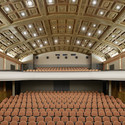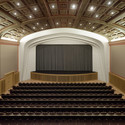
-
Architects: Studio Alexander Fehre
- Area: 1450 m²
- Year: 2012
-
Photographs:Zooey Braun

Text description provided by the architects. With more than 100-year-old history, the movie theater "Weltspiegel Cottbus" is one of the oldest cinema buildings of Germany and has stamped many childhood memories. A local enthusiast asked Studio Alexander Fehre to conceive a new overall concept for the former single-hall cinema and to give it a coherent interior design . Now two additional film halls with 80 places in each and a film bar belong in the annexe to the building. The historical hall with 520 places and a golden ceiling was utilised by a retractable platform also for events. By an exciting and universal interior design with references to the early film history an exciting merging of history and modern age succeeded.

The entry into the cinema is the escape from the reality. One meets this leitmotif in subtle manner first of all in the foyer which was completely redesigned. Right behind the entrance, you find two big chandeliers consisting of three brass-coloured photo lights in each case. They remind of the origin of the film technology, the sequence photography. Further moving on the carpet in the space, you will notice the special 3D-effect in the Moiré of the carpet . The ceiling of the foyer was revised from the necessary air diffusors and was held homogeneous to highlight the elliptical ceiling projection. Out of the column cladding projects a special video projector projects exactly in the elliptical ceiling elevation and opens thus an imaginary window in the fantasy world. The necessary slot diffusors for the incoming air were put in the side walls and combined with light slits. The bar area is cladded by textile elements running till the historical hall and creating, together with the oak veneer, a connection of the material worlds between both rooms. Through the listed staircase one reaches the balcony in the 1st upper floor. A picture wall shows photos from the history of the Weltspiegel.

The historical hall shines after careful renovation in new brilliance. It is the rare testimony from the early epochs of the still young medium Cinema. The panelled ceiling with its warm copper-golden tone owns exactly the right balance between reflexion and darkness for the movie projection. The ceiling is listed as a historic building element and was restored in the original state of 1911. In the cassettes light bulbs are built in which make the ceiling a star sky and slowly darken themselves with the beginning of the film. To the support of the light situation, fluorescent lamps were inserted at the side which emphasise the curvature of the ceiling and lend additional shine. In memory of silent film times when no loudspeakers disturbed the impression, all the loudspeakers a built into the wall and covered by the fabric of the wall panelling. pTo be able to use the hall for events which were a preoccupation of the developer, a special platform was developed in cooperation with the executive company. According to the usage requirements this platform be completely retracted and releases thus the parquet flooring located under it. The platform on which the chair rows are mounted can be retracted with a few hand movements like a telescope. A mechanical synchronisation is built in for the fact that the stages do not edge over and function smoothly for a long time. 520 seats were refurbished upholstered new, matching the old color concept. The board for glasses and snacks was also kept. The old stage was completely new built up, nevertheless, was left in her basic form and height and serves as a storage space for the chair rows.

The wood panelling in the ground floor changes between open lamella structure and closed cassettes and is designed like the original one in the balcony. Nevertheless, in the area of the entrances the wood panelling has an unusual detail to take up the fire extinguishers. This detail also stands for the playful experience a cinema should offer and subtly counteracts against the mainly classical appearance of the of the historic hall. The colour and material concept is orientated to the original tones of the ceiling and the wall elements and is complemented with new materials and colours, as for example of the chairs and the wall fabrics. Not only due to the history special attention was paid to the choice of the tones and materials, but also reach the demanded elegant appearance of the hall during events. The stage portal and the balcony were coated in the same tone to mark that these components did not exist in the old state in 1911, but were inserted in a rebuilding phase in the 50s.

The toilet rooms in the basement of the old building remind of past days with the textile cables on the ceiling and the black lights. The cables make their way, outgoing from an especially made distributor box, straight across the ceiling every single light. In the man's toilet the cables are moved strictly in parallel lines, in the lady's toilet, they describe a lose form. The washing places made of Corian float optically in front of the circular mirrors and lend size to the washing rooms. Together with the intensive colour of the walls a bridge is built to present time. The new established annexe with two new film halls and a bar in the ground floor completes the new total concept of the Weltspiegel. During regular movie times a reasonable extent of utilisation can be reached with the three film halls. If the historic building is booked for an event, the new annexe can continue to operate as a regular cinema with two halls . The staircasel in a triangular shape connects old building and new building and by the lift all film halls can by accessed by handicapped persons.

Both new film halls with 80 places in each case have a similar floorplan, but show two different archetypes. The hall 2 stands for the experienceable and narrative space, the black hall 3 is held very technical and allows the visitor an undeflected and concentrated movie experience. Allegorically for the digital projection technology the specific feature of the floorplan lies in the fact that the projector space is situated in the film hall. Both halls were equipped with a cooling ceiling, the incoming air is directed to the platform which is built as a hollow chamber. In the film hall 2 the folds of the wall panelling and the big round projection window remind of form and construction of old cameras. A small part of the special glass is clear for the projection, the rest of the surface is printed with graphics of a photo aperture. In addition downlight are inserted in the ceiling accentuating the seats and producing a connection between projector and the canvas. In contrast to the third hall, the rows are organized in a round shape.

In its black, technically modern appearance and with the light lines, the third film hall in the 2nd upper floor wakes immediately associations with science fiction films. Simultaneously it allows the visitor an immediate and strong cinematic experience, more than the other halls. The complete space is held in black and all loudspeakers are kept invisibly behind the wall fabric, nothing should distract from the film. The so-called "black box", consists of polygonal surfaces which folds from the ceiling to the wall, forming an exciting spatial structure. To intensify this even stronger, a LED light line follows this structure, outgoing from the projection room over the ceiling and up to the side walls of the canvas. The projection room is cladded with a field of hexagonal glass elements which reflect the room and make it even more abstract.

The new bar in the ground floor of the annexe can be operated regardless of the film playing times. The long L-shaped bar forms the approach point for the visitors and unites the ticket sale for the cinemas and the bar counter. The countertop on the one hand, extends from the bar and accentuates therefore the bar situation, on the other side the built in popcorn machine is showcased. The shelves on the back wall are laxly arranged, whitened plywood cubes and can be equipped adaptably. The lower ceiling is occupied by a LED line which describes a free form starting from built-in video projector to the folded mirror wall. The "new" old Weltspiegel Cottbus became a cinema which fulfils the longing for the splendid film palaces of the past times and delivers at the same time a statement for a contemporary city centre cinema. As a cultural center for a wide audience with concerts, cabaret, events and films in the most modern digital projection it still remains a place where memories get shaped.





















